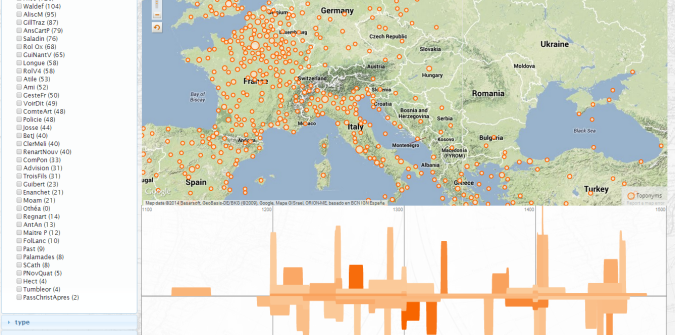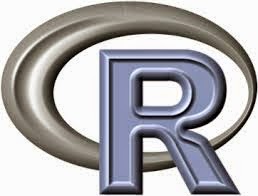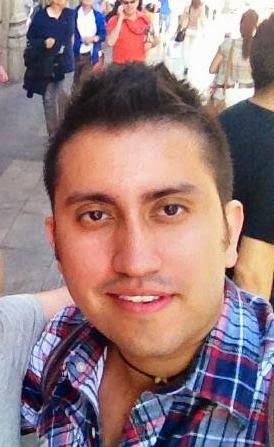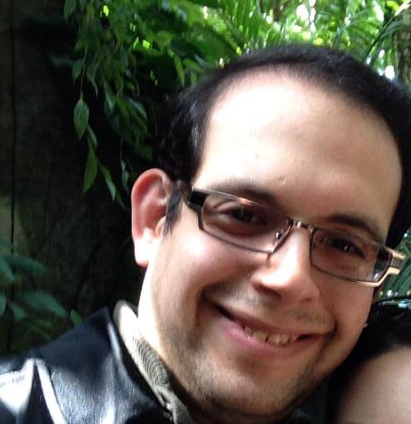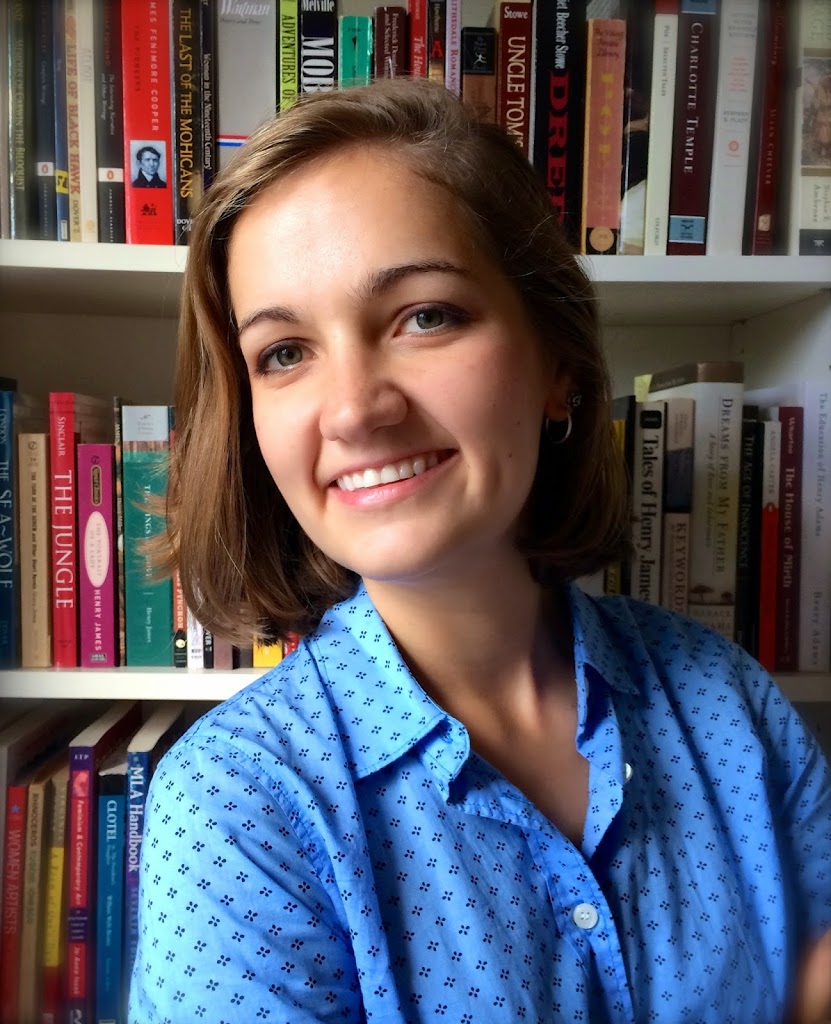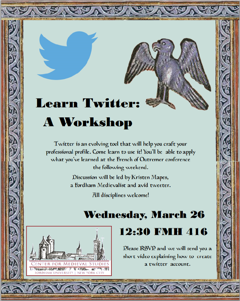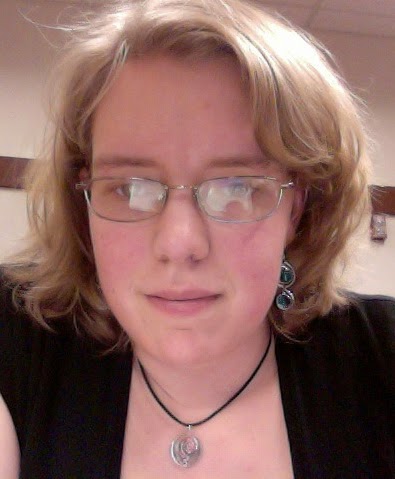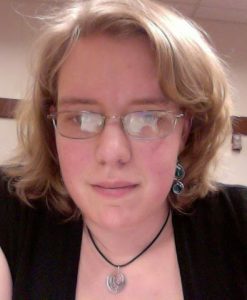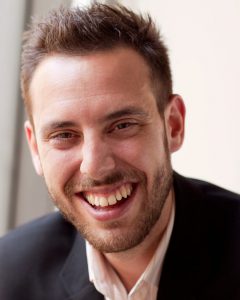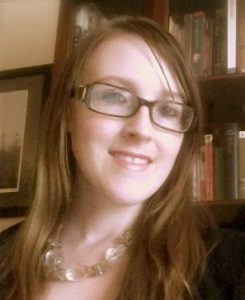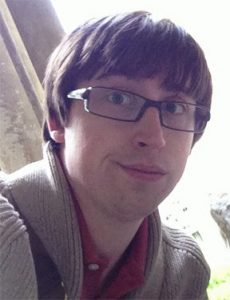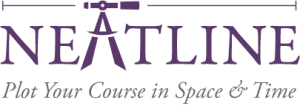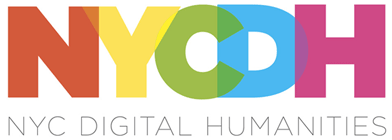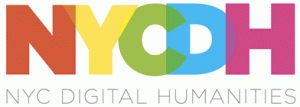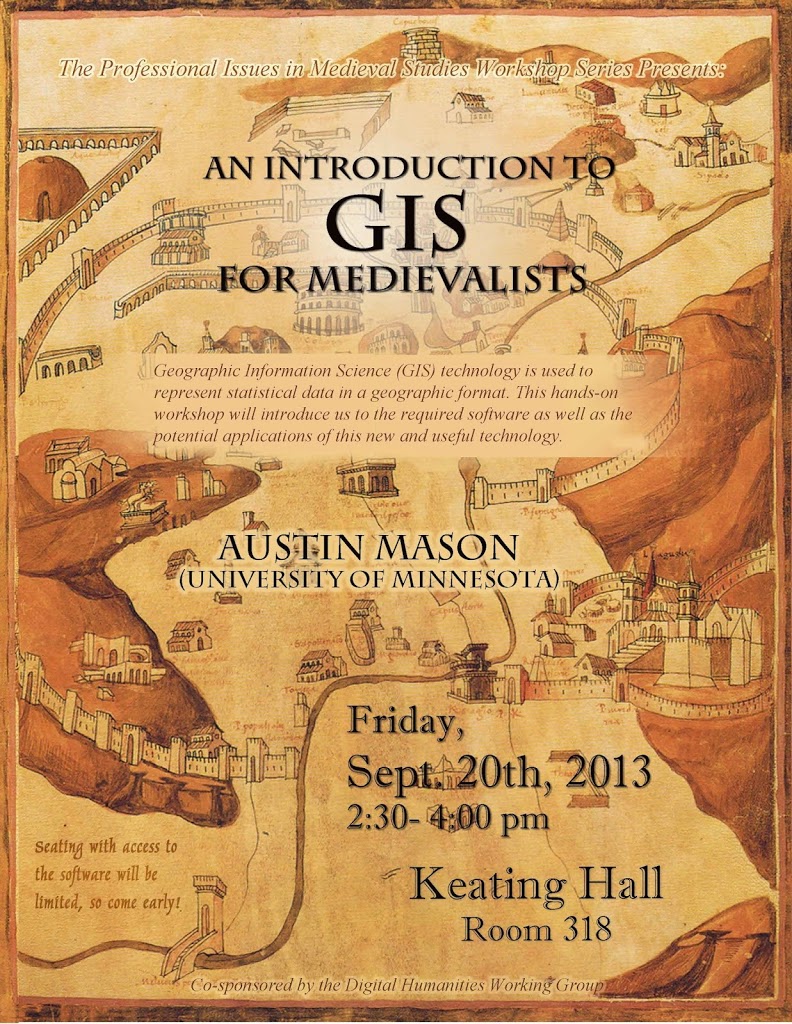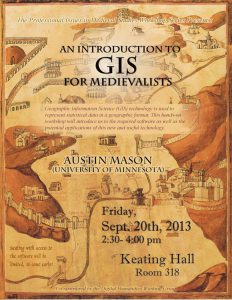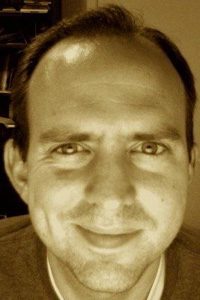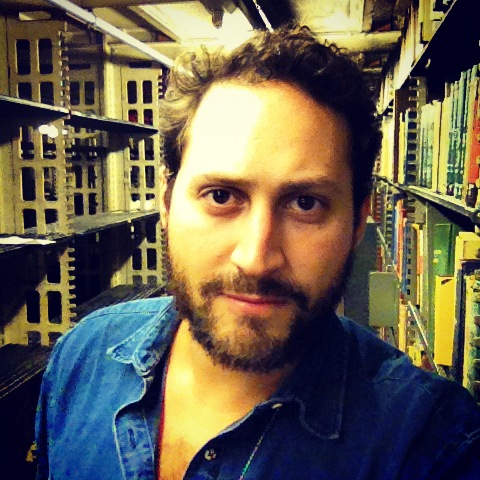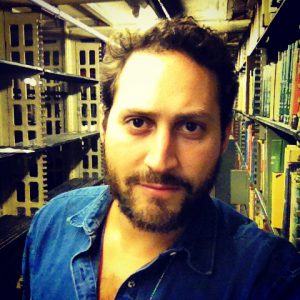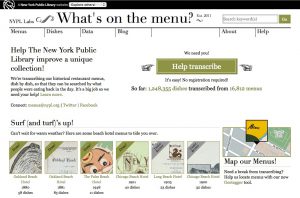Spring—a long awaited spring this year—brings a whole array of Digital Humanities programs and events at Fordham. Workshops on network mapping using Gephi, on Twitter for conference participation, and on developing an effective online presence for undergraduate and graduate students will be complimented by campus visits and public lectures by Miriam Posner (UCLA) on scholarly publishing in a digital age, Shinsuke Shimojo (Caltech) on computational science and neuroplasticity, and Tom Scheinfeldt (University of Connecticut) on best practices in digital history. The season will conclude with two conferences: a May 2nd-3rd THATCamp Digital Writing, and Fordham’s May 16th Faculty Technology Day.
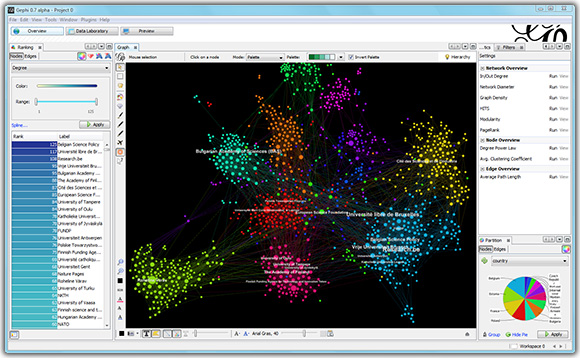 Wednesday, March 5: Using Gephi for Mapping Networks in the Humanities and Social Sciences, a network visualization workshop with Chris Alen Sula, PhD and Will Dean (Pratt Institute)
Wednesday, March 5: Using Gephi for Mapping Networks in the Humanities and Social Sciences, a network visualization workshop with Chris Alen Sula, PhD and Will Dean (Pratt Institute)
11:30am-2pm | Rose Hill Campus, Dealy 304
Learn how to use Gephi for network mapping for the humanities and social sciences at a workshop led by Dr. Chris Alen Sula (Pratt Institute). Gephi is an interactive visualization and exploration platform for all kinds of networks and complex systems, dynamic and hierarchical graphs. This free, open source tool runs on Windows, Linux and Mac OS X.
Chris Alen Sula is an Assistant Professor at the School of Information & Library Science at Pratt Institute and Coordinator of Digital Humanities. He earned his PhD in Philosophy from the City University of New York with a doctoral certificate in Interactive Technology and Pedagogy. His research focuses on data/information visualization, critical theory, networks, and the field of philosophy. He also writes about digital humanities and cultural heritage institutions (libraries, archives, and museums) and participates in public-academic work. Will Dean is a Master’s candidate at the School of Information & Library Science at Pratt Institute.
Space is limited. Registration is required. Download and install Gephi on your computer in advance of the workshop so you can follow along.
This workshop is sponsored by the Digital American Studies Initiative of the American Studies Program with support from the Dean of Fordham College at Rose Hill through the Innovative Pedagogy Initiative and by the Fordham Digital Humanities Working Group.
March 26, 12:30: Learn Twitter, a workshop led by Kirsten Mapes (Fordham/Medieval Studies)
12-2pm | Rose Hill Campus, Faculty Memorial Hall 416
Why tweet? What’s a #hashtag? Why would you want to type .@FordhamDH instead of @FordhamDH? Learn the answers to these questions and other questions at workshop led by Kirsten Mapes (Fordham/Medieval Studies). Twitter is an evolving social network tool that can help you develop your online profile and engage in public conversations in your field. Scheduled in advance of the Fordham Medieval Studies Program’s French of Outremer Conference, this workshop will introduce newcomers to the technology of tweeting as an aspect of conference participation. This workshop is sponsored by the Medieval Studies Program.
Wednesday, March 26: Thinking Through and With the Interface: Designing Humanities Scholarship for the Screen, a dinner talk and discussion with Miriam Posner, PhD (UCLA)
6-8pm | Lincoln Center Campus, 12th Floor, President’s Dining Room
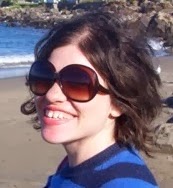 |
Miriam Posner,
UCLA Digital Humanities Center |
Join the Interdisciplinary Faculty Seminar on Digital Technology and Scholarly Communications for a talk with Dr. Miriam Posner, “Thinking Through and With the Interface: Designing Humanities Scholarship for the Screen,” which will explore multi-modal scholarship and new forms of scholarly communication. Posner serves as the Program Coordinator for UCLA’s Digital Humanities Program, teaches in their graduate and undergraduate digital humanities programs, and is at work on a multi-modal book on medical filmmaking; that is, the way doctors have used film to make sense of the human body. Dr. Posner earned her doctoral degree at Yale University in Film Studies and American Studies. For more about Dr. Posner’s work, visit her website at: http://miriamposner.com.
This program is free and open to the public, but space is limited and an RSVP is required.
Sponsored by the Fordham Interdisciplinary Faculty Seminar on Digital Technology and Scholarly Communication with the generous support of the Dean of Fordham College at Rose Hill through the Mellon Interdisciplinary Fund and the Innovative Pedagogy Initiative. In addition, Dr. Posner’s visit to New York City is co-sponsored through NYC-DH by the CUNY Digital Humanities Initiative.
Thursday, March 27: Sensory Substitution, Multisensory Plasticity, and the Third Kind of “Qualia,” a lecture by Dr. Shinsuke Shimojo (Caltech)
The Clavius Distinguished Lecture for 2014
1:00-2:00pm | Flom Auditorium, Walsh Library
Reception will follow on the fourth floor, O’Hare Special Collections Room.
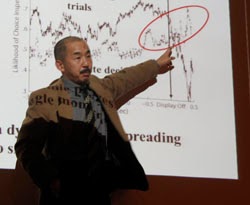 |
Shinsuke Shimojo (Caltech)
(photo by Gina Vergel) |
“Qualia” is a term used in philosophy to refer to individual instances of conscious experience. Examples of qualia include such sensory experiences as the pain of a headache, the bouquet of a wine, or the fragrance of gardenias on a summer evening.
In the past science has struggled with phenomena such as “qualia,” suggesting that such subjective experiences may be impossible to study. But new research in sensory substitution, such as the use of devices translating visual into auditory inputs for blind people, may suggest ways of apprehending the usually subjective experience of “qualia.” Some users of technologies that translate visual into auditory inputs for blind people now claim “visual” experiences. Moreover, at least one of these individuals shows neural activity in the visual cortical areas in fMRI when engaged in a variety of tasks relying on this type of device. This multisensory plasticity—the capacity of neural networks to remap themselves to accommodate new forms of sensory input—suggests that we are on the verge of a new era, where technologies are facilitating the development of new forms of qualia, or experience.
Join Professor Shinsuke Shimojo, from the Division of Biology/Computation & Neural Systems at the California Institute for the Technology, Fordam’s 2014 Clavius Distinguished Lecturer, to learn about his groundbreaking research bridging neurophysiology and information science to engage in the some of the oldest questions for philosophy of mind.
Shinsuke Shimojo received his PhD from MIT (1985), and is currently Gertrude Baltimore Professor in Experimental Psychology in the Division of Biology/Computation & Neural Systems at the California Institute of Technology (Caltech). The Shimojo Laboratory has been devoted to tackling the issue of how the human brain enables us to perceive objects and respond to them adaptively. Using visual illusions, adaptation and after effects, he and his colleagues have developed new psycho-physical and cognitive neuro-scientific techniques for enhancing our understanding of higher-order visual perception, spatial attention, integration across different sensory modalities, and sensory-motor functions.
Shimojo has authored or co-authored more than one hundred fifty publications in prestigious journals including Nature, Science, Nature Neuroscience, Neuron, and Proceedings of National Academy of Science. The latest findings from his laboratory indicate the importance of implicit cognitive and emotional processes in vision, multi-modal perception, and decision making. Among his many awards, he received the Japanese Neuroscience Society Tokizane Memorial Award in 2004 for his discovery of new perceptual phenomena related to visual contours and surfaces and his investigation of the underlying neural mechanisms. He also received the Most Innovating Research Award from the Japanese Society of Cognitive Science in 2008 for his work on counter-intuitiveness of Bayesian inference. For his series of books for non-expert general readers, he received the Santory Prize for Publications in Humanity and Social Sciences. He is also well known for his work as public intellectual, collaborating with artists in science museum exhibitions and writing regularly as a science columnist at the Asahi Shimbun’s WEBRONZA.
This lecture is made possible by the Clavius Distinguished Lecture Series and The Department of Computer and Information Science.
Friday, April 4: The Distinctive Lineage of Digital History, a lecture by Tom Scheinfeldt, PhD (University of Connecticut)
4:30-6pm | Lincoln Center Campus, Room TBA.
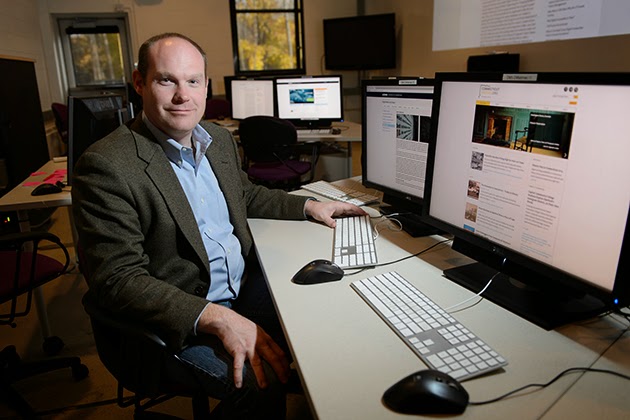 |
Tom Scheinfeldt, Director of Digital Humanities,
University of Connecticut
(photo: courtesy of UConn Today) |
Tom Scheinfeldt, nationally known for his leadership role at the Roy Rosenzweig Center for History and New Media (CHNM) at George Mason University, now serves as an Associate Professor of Digital Media and Design and Director of Digital Humanities at the University of Connecticut. Dr. Scheinfeldt has been behind such pathbreaking initiatives as the September 11 Digital Archive, Omeka, and THATCamp. He is co-editor (with Dan Cohen) of Hacking the Academy: New Approaches to Scholarship and Teaching from Digital Humanities (University of Michigan Press, 2013) and a contributor to Debates in the Digital Humanities (University of Minnesota Press, 2012). He blogs at Found History and co-hosts the Digital Campus podcast.
Professor Scheinfeldt will lecture on “Best Practices in Digital History” at Lincoln Center and will lead a series of working sessions during the day with a small group of faculty and graduate students in the History Department. Discussions will focus on a plan of action for the department to incorporate digital history into its practices and culture. Participants in the working sessions will consider how they can model digital history practices in pilot programs, become educators of others in the department, and lead new departmental initiatives in coming years.
This program is organized by Professor Roger Panetta (History) and hosted by the History Department with support from the Dean of Fordham College-Rose Hill through the Innovative Pedagogy Initiative.
Wednesday, April 16: Your Online Presence: Google, Facebook, and Life Ahead, a workshop for undergraduates by Alisa K. Beer (Fordham/History Department)
12-2pm | Rose Hill Campus, Dealy 304.
As part of the Digital American Studies Program, this workshop for undergraduate students will focus on online presentations of self and how to maximize your digital presence for life and work ahead. The workshop will be led by Alisa K. Beer, who holds a Masters of Library Science from the School of Library and Information Science of Indiana University at Bloomington, currently serves as a HASTAC scholar and is at work on a doctoral degree in Medieval Studies at Fordham. Beer is concerned with helping students understand their digital footprint so that their pathways beyond undergraduate education will be smooth and fulfilling.
This workshop is sponsored by the Digital American Studies Initiative of the Fordham American Studies Program with support from the Dean of Fordham College-Rose Hill through the Innovative Pedagogy Initiative and by the Fordham Digital Humanities Working Group.
Friday & Saturday, May 2-3: THATCamp Digital Writing
Friday at John Jay College and Saturday at Fordham Lincoln Center—for more detailed scheduling information, visit ThatCamp Digital Writing.
Registration will open March 3rd, 2014.
From tweeting to multimodal research papers to Prezi, writing these days means more than just black text on a white background. Through workshops and discussions, THATCamp Digital Writing aims to deepen and advance our notions of all facets of writing. Participants in THATCamp Digital Writing will explore how to effectively write using different digital tools and platforms. THATCamp Digital Writing begins with a special lecture on Friday afternoon, May 2, 2014, at John Jay College, and continues all day Saturday, May 3, 2014 at Fordham University’s Lincoln Center campus with workshops, discussions, and a Maker Challenge.
At THATCamp Digital Writing, join a dynamic cast of participants to:
• Learn more about innovative ways to digitize your work and publish it online
• Share pedagogical methods that use digital media for writing and research assignments
• Explore how to evaluate online writing and give feedback
• Question how tools, technology, and methods for publishing work shape the way we write
• Educate yourself about fair use and copyright
• Make connections with others
• Establish new collaborations.
TCDW is being organized by Amanda Licastro, a PhD candidate at the CUNY Graduate Center, and Elizabeth Cornell, Information Technology Communications Specialist, Fordham University.
Monday, May 12th: Faculty Technology Day
Fordham Lincoln Center Campus, 12th Floor Lounge.
Hold the date — additional information will follow!
[Updates: On March 5th the listing for our Gephi workshop was updated to include the contributions of Will Dean. And on March 14th, the title of Tom Scheinfeldt’s talk was updated from Best Practices in Digital History to The Distinctive Lineage of Digital History on March 14th.]
